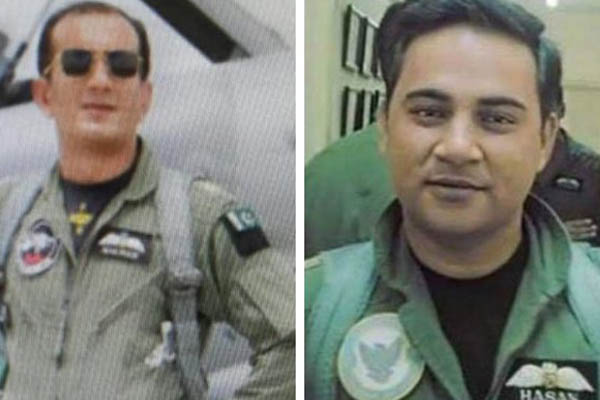Written by: Senator Mushahid Hussain Sayed
Posted on: September 05, 2020 |  | 中文
| 中文
Recipients of the highest military honor, Nishan-e-Haider. Back Row (L to R): Raja Muhammad Sarwar Shaheed, Tufail Muhammad Shaheed, Raja Aziz Bhatti Shaheed, Rana Shabbir Sharif Shaheed, Muhammad Akram Shaheed and Karnal Sher Khan . Front Row (L to R): Muhammad Mahfooz Shaheed, Lalak Jan Shaheed, Rashid Minhas Shaheed, Muhammad Janjua Shaheed.
The Defence Day of Pakistan is commemorated on September 6 every year to pay homage to the defenders of Pakistan, particularly the armed forces as well as other members of the security forces who have laid down their lives to protect Pakistan from aggression. The Defence of Pakistan day originated in the wake of the September 1965 war when India committed aggression against Pakistan and attacked Lahore on September 6, which resulted in a 17-day long military conflict between Pakistan and India. Since then, the notion of Defence Day has evolved, given the changing nature of threats and different kinds of conflicts faced by the Pakistani state and society.
Direct military conflicts and armed engagements between Pakistan and India since 1965 include the 1971 war, the 1999 Kargil conflict and the 2019 Indian aggression against Pakistan, when Indian planes crossed the border to bomb Balakot. On the latter occasion, Pakistan retaliated by shooting down 2 Indian planes and capturing an Indian Air Force pilot. However, since 9/11, there has also been military confrontation within Pakistan, between homegrown extremism that morphed into violence through terror outfits.

Squadron Leader Hassan Siddiqui and Wing Commander Nauman Ali Khan, who shot down an IAF plane on February 2019
Various military operations were also launched by the Pakistan Army to counter terrorist threats, but the barbaric attack on school children studying in the Army Public School in Peshawar, raised the terrorist threat to a new level. It resulted in the formulation of the National Action Plan (NAP) to counter terrorism and extremism, with the unanimous support of all political parties in the parliament.
Another important factor that has impacted on national security and defence has been the nuclear factor. In 1998 Pakistan, after India’s nuclear tests on May 11, followed suit on May 28, becoming the first nuclear power in the Muslim World. A “balance of terror” since then has precluded the possibility of direct Indian military aggression of Pakistan.
During this process, the notion of national security has also been redefined in the changing security landscape of Pakistan and the region. National security is no longer defined in purely military terms such as tanks, army, planes, nuclear weapons and missiles. Its scope now includes civilian components like protecting human security: economy, energy, human rights, rule of law, political parties, constitution, parliament, health, education, population planning, cyber security and climate change.
Pakistan is the only Muslim country post 9/11 which has successfully waged an inland war against terrorism and extremism wherein the armed forces and the people, soldiers and civilians alike, have collectively struggled and sacrificed, suffering more than 70,000 casualties during this period. This has only been possible because the state and society were on one page to combat the threat within of terrorism and extremism, which were remnants of the decades-long Afghan war in which Pakistan played a pivotal role along with its Western allies.
This difficult period has also been of a “course correction”, with lessons learnt from mistakes made in the past.
Three such mistakes are noteworthy. First, as the September 1965 war and the 1999 Kargil conflict demonstrate, there were flawed assumptions of our military planners that proved costly for the country. In both conflicts, the assumption about Indian intentions and Indian reaction to Pakistan’s actions proved to be fatally wrong. Ironically, the mistake of 1965 was repeated 34 years later in 1999.
The second mistake was a singular one done by the policymakers in the 1971 war: military action and use of force against our own people, which resulted in alienating the populace they were supposed to be protecting. This mistake has been repeated, albeit, on a smaller scale, in Balochistan in the 1970s, as well as in the former FATA, and Balochistan again in the 21stcentury. In battling insurgencies, it is critical to separate the vast majority of the people from the insurgents; otherwise, it will only help the cause of the insurgency.
The third mistake emanated from a flawed Afghan policy and its domestic imprint within Pakistan, where an informal distinction was sought to be drawn between the so-called ‘good Taliban’ and the ‘bad Taliban’, as if the former could be ‘used’for purposes of political and strategic leverage, a cynical opportunist policy that wasn’t only flawed but which ended up in failure, including naive notions like ‘strategic depth’.
For the future, defending Pakistan should be viewed in a context, where the armed forces and the people collectively contribute to preserving, promoting and protecting the lives of the people with human security as the priority. In doing so, the process should be institutional, transparent and rooted in the rule of law so that issues like missing persons or enforced disappearances do not detract from the primary goal of protecting Pakistan from enemies, both within and without.
Since, this year, the Defence of Pakistan Day coincides with threats of pandemics, like the ongoing battle against the Coronavirus, or natural disasters, like the disastrous floods in Karachi, national priorities need to be reset in a manner corresponding to these new realities. Human Security is the paramount pillar of National Security and Defence of Pakistan, and that means not just warding off foreign aggression, but protecting and defending the lives and welfare of the people of Pakistan from all kinds of threats, military and non-military.
You may also like: